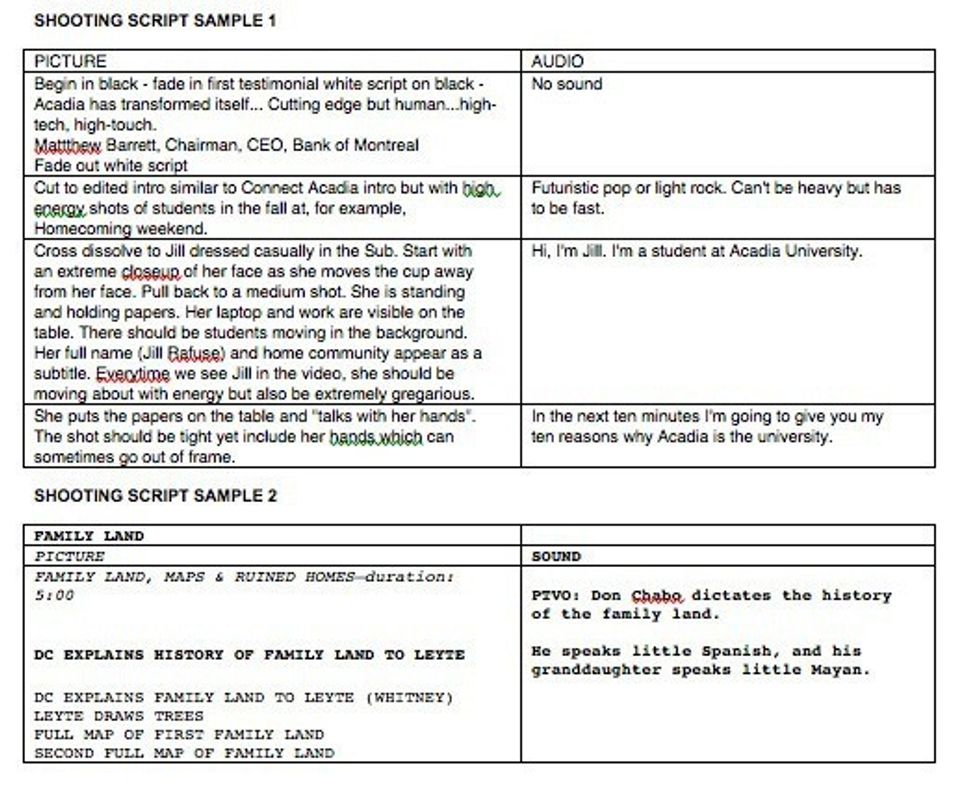
Writing a great screenplay is hard, but getting it ready for production is a challenge unto itself. There are lots of things you need to consider, like shot lists, call sheets, and script lining so you productions go more smoothly. To get all this ready, first, you need to create a shooting script.
But what’s a shooting script?
Today, we’ll go over a few examples, look at a rough template, and define shooting scripts for you and your crew.
Let’s go!
What is a shooting script?
A shooting script is the version of a screenplay used during the production of a motion picture or a television show. Shooting scripts are different from spec screenplays. They incorporate scene numbers and follow a well-defined set of procedures that specify how revisions to the screenplay are implemented and circulated among cast and crew.
Check out Christopher Nolan’s shooting script for Memento.

The shooting script is usually created by the director and cinematographer. But on smaller productions or television shows the screenwriter might be involved as well, especially if they are generating new pages during production.
Script Revisions
There is a standard order for these revision colors. According to the WGA west, the standard script revision color sets are:
- White (unrevised)
- Blue
- Pink
- Yellow
- Green
- Goldenrod
- Buff
- Salmon
- Cherry
- Second Blue Revision
- Second Pink Revision and so on…
Who uses the shooting script?
The director and cinematographer sit with this document and discuss their ideas and shot plan desired for the movie. They line these scripts so that they know what kinds of camera angles and movement they want in each scene. The shooting script is then broken into shots, featuring cinematography jargon such as close-ups, medium shots, and wide shots.
The cast gets sent the pages on script sides so they know what’s being shot that day. Those sides are prepared by the production or by the Writers’ Production Assistant or Assistant.
All changes to the script should be marked with asterisks and written in revisions mode.
 Credit: Adobe Story
Credit: Adobe Story
When is a shooting script made?
After a spec script is purchased, the director and cast are attached. Then the movie goes into pre-production. In television, episodes are sent to the network, given notes, rewritten, and approved. Then the scene numbers are added so they can break each down individually.
If you want to make a shooting script, see if your screenwriting software has a template you can use. Otherwise…
Shooting script template
Here are some things your shooting script should include:
- Scene numbers
- Camera angles/directions
- Detailed special effects
- Detailed stunt work/action sequences
- Specific information on sets, costumes, lighting
- Special notations regarding acting
Those six things matter to the entire production. So make sure your production management software can help you handle all that stuff. Otherwise, the free template in the header link is a good place to start.
Shooting script examples
Now that you get the gist, let’s look at a few examples to help hammer home the point. The first comes from a class assignment at Acadia University. It has two columns and shows the images on one side and the audio on another. It should have more detailed camera angles, but right now they are described within the paragraphs.
The more detail you have, the easier it is for your cinematographer to line your script.
 Credit: Acadia University
Credit: Acadia University
The next example comes from John August’s GO screenplay. On the cover page, you can clearly see how many revisions the screenplay went through before actually getting to the production draft. Inside, you can see that all the scene numbers are ready and locked.
The pages are marked with the date as well, so we know it’s current.



Shooting scripts tend to be longer than actual screenplays because each new scene gets inserted on its own page. They also take on new numbers if they go between other scenes. So if you were inserting a scene between scene one and scene 2, you’d call it Scene 1A and so on.
Got questions on shooting scripts? Put them in the comments below!
What’s next? Free Call Sheet Generator!
Film Production is an intense experience. At times it’s a war and war can get expensive. Wouldn’t it be nice to find some free solutions?
Click the link to learn more!
Author: Jason Hellerman
This article comes from No Film School and can be read on the original site.
